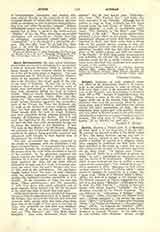

Autran, JOSEPH, a French poet, b. at Marseilles June 20, 1813; d. in the same city, March 6, 1877. He pursued his classical studies in the Jesuit college of Aix. His father, however, having met with reverses, Autran, obliged to earn his own living, accepted a position as teacher in a religious school. Thus engaged, he published the first work which drew attention to his merits as a poet; this was an ode written on the occasion of Lamartine’s departure for the Holy Land. “Le Depart pour l’Orient” was followed (1835) by a collection of poems entitled “La mer”, remarkable for descriptive power and the charms of its versification. The favor with which it was received led him to publish a second series of the same subject, “Les Poemes de la mer”, which appeared in 1852. Meantime, he had written another volume of lyrics “Ludibria ventis”, which served to increase his popularity as a singer; also a prose work, “Italie et la Semaine sainte a Rome” (1841), the fruit of a voyage to the Eternal City. The French conquest of Algiers suggested the subject of an epic poem, “Milianah”, published in 1842. In 1848 “La Fille d’Achille”, a tragedy in five acts, shared with Emile Augier’s “Gabrielle” the Prix Monthyon awarded by the French Academy. This was followed by: “Laboreurs et Soldats” (1845), “Vie rurale” (1856), crowned by the French Academy; “Epitres rustiques”; “Le poeme des beaux jours” (1862); “Le Cyclope”, a drama after Euripides (1869); “Les Paroles de Salomon”; “Sonnets Capricieux” (1873); “La Legende des Paladins” (1875). In 1868 Autran was elected a member of the French Academy to succeed Ponsard. In his later days he was stricken with blindness. Autran, though not a poet of the first rank, is a writer whose noble sentiments, chaste imagination, and religious feeling will always endear him to lovers of pure and refreshing poetry. All his works are remarkable for their purity of expression, the music of their rhythm, and a profound feeling for the beauties of nature.
JEAN LE BARS

